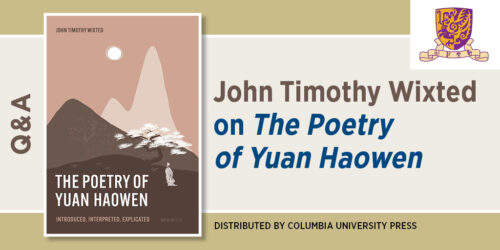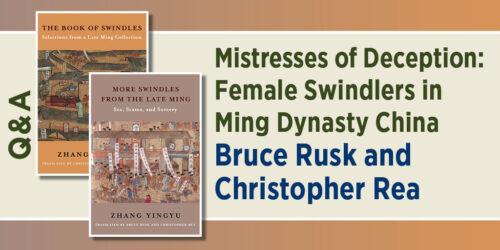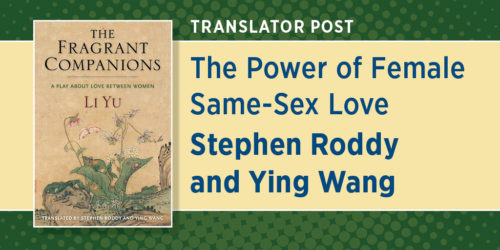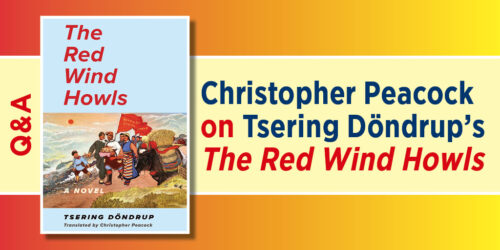Yang Mu and Western Literary Tradition
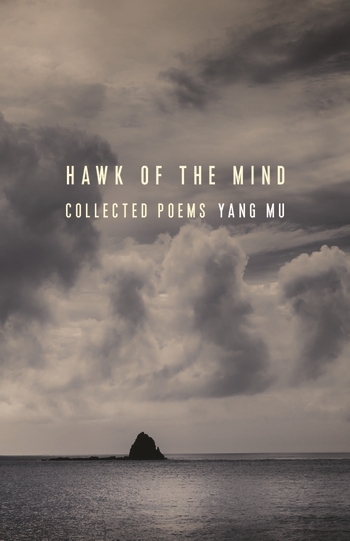
We are closing Poetry Month today with the second of a two-part post on Yang Mu, a towering figure in modern Chinese poetry. This post, written by Xiaohan Du, a Ph.D. Candidate in Art History at Columbia University focuses on Yang Mu’s ability to allude to the Western literary tradition.
• • • • • •
As a young poet in the 1950s, Yang Mu was widely exposed to Western literature and was especially drawn to English Romanticism—Shelley and Keats in particular; later as a student of comparative literature in the US at UC Berkeley, he studied a wide range of Western classics, from ancient Greek and Roman to Old English and medieval German, to Anglo-American modernism. A fascinating aspect of Yang Mu’s poetry is his ability to allude to the Western literary tradition and the myriad poetic ambiences he is able to create from those allusions. One of his most evocative works is The Vacated Seat:
Mony klyf he ouerclambe in contrayez straunge,
Fer floten from his frendez fremedly he rydez
Gawain
In the room there is a whiff of autumn
leaves burning, as when in days gone by
while reading by the window you chanced to hear
in the wind chimes hanging from the eaves of a far-off
building a vaguely discernable solitude. I know all too well
when I turn this page our hero will rise from his chair, clad
himself in armor
feed his mount
test his blade and inspect his pennant
then set forth against all odds to vanquish those fire-breathing
dragons
and whatnot, thus saving the proverbial damsel in distress
from castle perilous. His chair sits emptily
there, in the uncertain sunlight
basking hour after hour
1998 (Bradbury)
This poem paints a vignette of an intimate moment inspired by a line from the Middle English chivalric romance Sir Gawain and the Green Knight, from which the epigraph is quoted: “Many fells he climbed over in territory strange,/ Far distant from his friends like an alien he rides.” A tragic sense of solitude permeates the epigraph, which Yang Mu brilliantly perpetuates in the aura of this short poem. In the romance itself, it is the knight who rides like an alien; Yang Mu is able to enrich and complicate this motif from the original source by collapsing the departure and resulting absence into the time and space of the “he” who is in the middle of reading that very romance: “his chair sits emptily there/in the uncertain sunlight/basking hour after hour.” Furthermore, to paint an image of an empty chair at the very end of the poem gives infinite possibility to what happens beyond the poem itself as the reader imagines that the sedate scholar who has been heretofore “reading by the window” has finally decided to leave the comfortable yet confined space of the study and venture into the real world, perhaps inspired by the chivalric spirit of the Green Knight. The act of rising from the chair is used as a poetic motif, in the Middle English romance and then repeated in Yang Mu’s poem. Correspondingly, the reader encounters this motif twice: first mediated by the poet reading the medieval romance, and then by witnessing the vacated seat at the end. By effectively evoking the cyclical nature of historical time through the act of reading, Yang Mu leads the reader through a landscape of amorphous shape and meaning, leaving one feeling vertiginous in the richness of his poetic vision.
Reading The Vacated Seat is a multisensory experience. Senses of smell, sound, vision, and touch are embedded in this elegantly compact poem. For example Yang Mu opens the poem with “In the room there is a whiff of autumn/leaves burning” which immediately brings to the reader’s mind that cozy yet unshakable feeling of melancholy that epitomizes autumn.
Writing poetry is a beautiful struggle for Yang Mu. This struggle and its ineluctability is compellingly captured in the eponymous poem of this anthology, Hawk of the Mind:
Hawk is flying to a sunlit place
he plunges to this island and in my shadow
I see leaves strewn over the balcony
rustling like the poems I shed last autumn
he hovers south
and away. I stand
to face the sea
losing Hawk entirely
I imagine him flickering away
a fugitive, or returning to the woods
for like me he is weary of truth or its equivalents–
I hope he skirts above the desolate coast
periodically regarding his own swift manner
vastly still, surging through my cold mental valley.
1992 (Li and Bramwell)
Categories:National Poetry MonthPoetryTranslation


